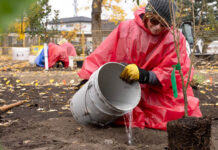
It’s been well documented that being connected to a community is an important part of good mental health. Regular social interaction and support provides a sense of value and belonging, and it can even help prevent cognitive decline and the onset of mental illness, like depression, as we age.1
That’s all well and good, but what if you’re not someone who is outgoing or who finds socializing easy?
When we’re younger, life has a way of forcing us into situations that expose us to the community around us. We connect with people at work, we socialize with other parents at the playground or at our children’s activities, and we may meet and greet others at a place of worship. But how do you create a community and reap the benefits of regular connection with friends and neighbors when those natural opportunities for creating connections are gone?
As with many things, the answer lies within you. Even if you’re someone who is introverted and more apt to enjoy your own company, there are ways you can comfortably break out of your routine start enjoying the many benefits of reaching out to the community around you.
- Learn to take the lead: It might not come naturally to you, but there is comfort in being the one in control. So if joining a new club or group fills you with dread, take the reins and create a group that feels comfortable to you. Remember, that “group” can be you and just one other person! Invite a friend or neighbor over to participate in an activity you enjoy. Maybe it’s watching an old movie, or playing a game of cards, or indulging in a pot of tea and a sweet treat. Whatever you choose, make sure the activity is something you love to do. Try to make this a regular occurrence, either with this friend or a different one or, eventually, even a small group.
- Start small. As we mentioned, a “group” can be you and just one other person. Don’t host a potluck for everyone on your floor; instead invite one or two of them over for cocktails. While contact with people via social media isn’t the same as creating a physical sense of community with people around you, don’t forget that connecting with others online is still a wonderful way to reach out, communicate and enjoy some of the benefits of social interaction. Looking for online groups of people who share a common interest, or who have a shared background or experience will make reaching out and introducing yourself a little easier.
- Set limits. Knowing that you struggle, don’t overextend yourself. If an hour of socializing is all you can manage, an hour it is! Let your guest or guests know that you only have a certain amount of time to spend with them, and stick to it. If you have chosen to attend an activity or event in your community, the same rules apply. Set a time limit for yourself and leave when you need to. Self-care is very important when social exposure exhausts you.
- Plan ahead. An escape plan is often a necessity for introverts or those who struggle with social anxiety. If you’re able, drive yourself to social activities so you know you can leave whenever you want.
Remember, for some people social contact is emotionally and physically draining. There is nothing wrong with feeling that way – the trick is finding ways to reach out that are as comfortable as possible for you, and knowing when it’s time to go back home and recharge your batteries. Balance is key.
However, if you used to enjoy social contact and group activities but no longer do, and you find you’re increasingly self-isolating, it might be time to have a chat with your doctor. Listen to your inner voice. You know when something just isn’t right, and ignoring your gut feeling and pretending you’re okay when you know you’ve reached a point where your stress levels and anxiety are impacting your relationships, and your everyday life, is only harming you more. Be proactive about your mental health and do what you can to make sure you are receiving the kind of care and attention you deserve. There is no shame in needing and asking for help.
SOURCES
416302C CAN/US (06/18)




